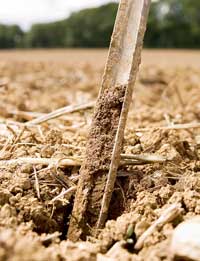Elm Farm 2010: Soil testing for organic crops

Regular soil nutrient testing is necessary to ensure growers do not limit crop access to potassium (K), which, although held in sizeable reserve in some soil types, is only released very slowly.
Elizabeth Stockdale of Newcastle University told delegates soil type mattered. Large sand particles and small silt particles would yield little K to crops. Clay particles would release more but only in certain soil types. “So you can see it would be very easy to have an adequate K index but to undersupply a growing crop.”
Some crop samples could establish what K plants were able to access. “Certain crops can mine soils for K very effectively. For example, if you have grass in a rotation and have silage analysed ask the lab for the K reading. It’s often available for no extra cost but it’s just not normally asked for,” she told delegates.
The inclusion of organic matter in soils improves access to K by providing more places for it to ‘stick’ to, she added.

